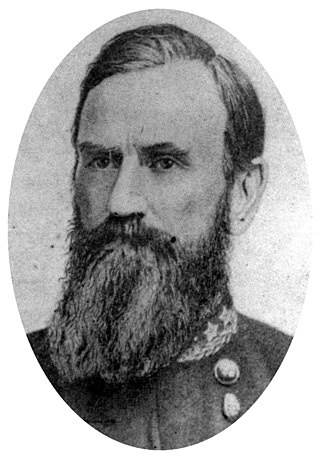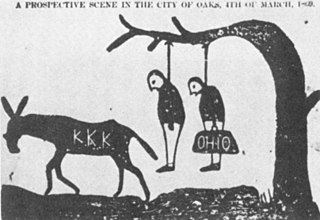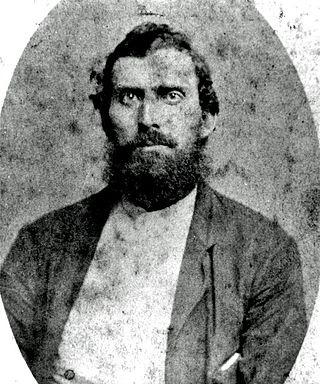Related Research Articles

The American Civil War was a civil war in the United States between the Union and the Confederacy, which was formed in 1861 by states that had seceded from the Union. The central conflict leading to war was a dispute over whether slavery should be permitted to expand into the western territories, leading to more slave states, or be prohibited from doing so, which many believed would place slavery on a course of ultimate extinction.

The Confederate States of America (CSA), commonly referred to as the Confederate States (C.S.), the Confederacy, or the South, was an unrecognized breakaway republic in the Southern United States that existed from February 8, 1861, to May 5, 1865. The Confederacy was composed of eleven U.S. states that declared secession; South Carolina, Mississippi, Florida, Alabama, Georgia, Louisiana, Texas, Virginia, Arkansas, Tennessee, and North Carolina; they warred against the United States during the American Civil War.

The Reconstruction era was a period in United States history and Southern United States history that followed the American Civil War and was dominated by the legal, social, and political challenges of the abolition of slavery and the reintegration of the eleven former Confederate States of America into the United States. During this period, three amendments were added to the United States Constitution to grant citizenship and equal civil rights to the newly freed slaves. To circumvent these legal achievements, the former Confederate states imposed poll taxes and literacy tests and engaged in terrorism to intimidate and control black people and to discourage or prevent them from voting.

Jones County is in the southeastern portion of the U.S. state of Mississippi. As of the 2020 census, the population was 67,246. Its county seats are Laurel and Ellisville.

Benjamin Grubb Humphreys was an American politician from Mississippi. He was a general in the Confederate States Army during the American Civil War and served as Governor of Mississippi from 1865 to 1868, during Reconstruction.

The legal institution of human chattel slavery, comprising the enslavement primarily of Africans and African Americans, was prevalent in the United States of America from its founding in 1776 until 1865, predominantly in the South. Slavery was established throughout European colonization in the Americas. From 1526, during the early colonial period, it was practiced in what became Britain's colonies, including the Thirteen Colonies that formed the United States. Under the law, an enslaved person was treated as property that could be bought, sold, or given away. Slavery lasted in about half of U.S. states until abolition in 1865, and issues concerning slavery seeped into every aspect of national politics, economics, and social custom. In the decades after the end of Reconstruction in 1877, many of slavery's economic and social functions were continued through segregation, sharecropping, and convict leasing. Involuntary servitude as a punishment for crime is still legal in the United States.

In United States history, scalawag was a pejorative slur referred to white Southerners who supported Reconstruction policies and efforts after the conclusion of the American Civil War.
The Black Codes, sometimes called the Black Laws, were laws which governed the conduct of African Americans. In 1832, James Kent wrote that "in most of the United States, there is a distinction in respect to political privileges, between free white persons and free colored persons of African blood; and in no part of the country do the latter, in point of fact, participate equally with the whites, in the exercise of civil and political rights." Although Black Codes existed before the Civil War and although many Northern states had them, the Southern U.S. states codified such laws in everyday practice. The best known of these laws were passed by Southern states in 1865 and 1866, after the Civil War, in order to restrict African Americans' freedom, and in order to compel them to work for either low or no wages.

The Richmond and Danville Railroad (R&D) Company was a railroad that operated independently from 1847 until 1894, first in the U.S. state of Virginia, and later on 3,300 miles (5,300 km) of track in nine states.

The Lost Cause of the Confederacy is an American pseudohistorical and historical negationist myth that claims the cause of the Confederate States during the American Civil War was just, heroic, and not centered on slavery. First enunciated in 1866, it has continued to influence racism, gender roles, and religious attitudes in the Southern United States into the 21st century. Historians have dismantled many parts of the Lost Cause mythos.

The history of North Carolina from pre-colonial history to the present, covers the experiences of the people who have lived within the territory that now comprises the U.S. state of North Carolina.

Mississippi was the second southern state to declare its secession from the United States, doing so on January 9, 1861. It joined with six other southern states to form the Confederacy on February 4, 1861. Mississippi's location along the lengthy Mississippi River made it strategically important to both the Union and the Confederacy; dozens of battles were fought in the state as armies repeatedly clashed near key towns and transportation nodes.

In the United States, Southern Unionists were white Southerners living in the Confederate States of America opposed to secession. Many fought for the Union during the Civil War. These people are also referred to as Southern Loyalists, Union Loyalists, or Lincoln's Loyalists. Pro-Confederates in the South derided them as "Tories". During Reconstruction, these terms were replaced by "scalawag", which covered all Southern whites who supported the Republican Party.

Newton Knight was an American farmer, soldier, and Southern Unionist in Mississippi, best known as the leader of the Knight Company, a band of Confederate Army deserters who resisted the Confederacy during the Civil War. Local legends tell of Knight and his men forming the "Free State of Jones" in the area in and around Jones County, Mississippi, at the height of the war. The nature and extent of the Knight Company's opposition to the Confederate government is disputed among historians. After the war, Knight joined the Republican Party and served in Mississippi's Reconstruction government as a deputy U.S. Marshal.
Jacquelyn Dowd Hall is an American historian and Julia Cherry Spruill Professor Emerita at the University of North Carolina at Chapel Hill. Her scholarship and teaching forwarded the emergence of U.S. women's history in the 1960s and 1970s, helped to inspire new research on Southern labor history and the long civil rights movement, and encouraged the use of oral history sources in historical research. She is the author of Revolt Against Chivalry: Jessie Daniel Ames and the Women’s Campaign Against Lynching;Like a Family: The Making of a Southern Cotton Mill World and Sisters and Rebels: The Struggle for the Soul of America.
The following list is a bibliography of American Civil War Confederate military unit histories and are generally available through inter-library loan. More details on each book are available at WorldCat. For an overall national view, see Bibliography of the American Civil War. For histories of the Union, see Bibliography of American Civil War Union military unit histories. For a guide to web sources see: Carter, Alice E.; Jensen, Richard. The Civil War on the Web: A Guide to the Very Best Sites—Completely Revised and Updated (2003).
Rachel Knight was the African-American common-law wife to Confederate army deserter Newton Knight (1829-1922). In 1881 she was baptized into the Church of Jesus Christ of Latter-day Saints. She was depicted by Gugu Mbatha-Raw in Gary Ross' 2016 feature film Free State of Jones.
William M. Hancock was a judge and state legislator in Mississippi. His father was Judge Jubal Braxton Hancock.
The 7th Battalion Mississippi Infantry was a unit in the Confederate States Army during the American Civil War, formed of volunteers from southern Mississippi. The Battalion was organized at Quitman, Mississippi, in May 1862.
The 27th Mississippi Infantry Regiment was a regiment of infantry in the Confederate States Army during the American Civil War. The 27th Mississippi fought in many battles of the Western theater in Kentucky, Tennessee, and Georgia.
References
- ↑ "Victoria E. Bynum". University of North Carolina Press . Retrieved 2021-11-09.
- ↑ Bynum, Victoria E. (1987). Unruly women : the relationship between status and behavior among free women of the North Carolina Piedmont, 1840-1865. University of California, San Diego.
- ↑ "Bynum, Victoria". Texas State University. 2021-11-19. Retrieved 2023-09-07.
- ↑ Walsh, David; Laurier, Joanne. "An interview with Victoria Bynum, historian and author of "The Free State of Jones"". World Socialist Web Site. Retrieved 9 November 2021.
- ↑ Blow, Charles (June 27, 2016). "White Savior, Rape and Romance?". New York Times. Retrieved 9 November 2021.
- 1 2 Cieply, Michael (July 29, 2009). "Civil War Fires Up Literary Shootout". New York Times. Retrieved 9 November 2021.
- ↑ "We Respond to the Historians Who Critiqued the 1619 Project". New York Times. January 19, 2021. Retrieved 9 November 2021.